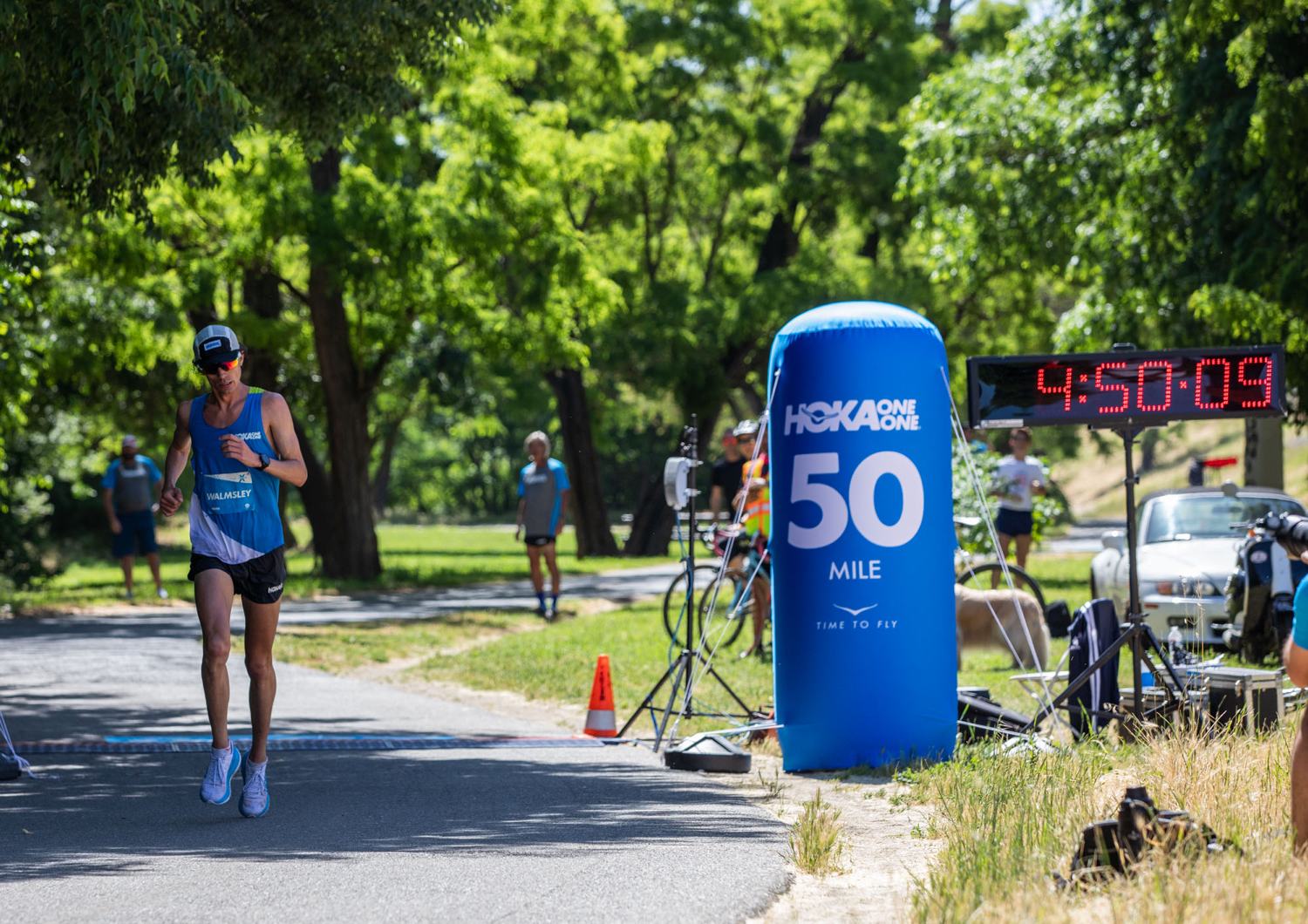A few years ago, I competed in the first iteration of the Hoka Project Carbon X 100-kilometer event, which was both a race and a showcase for the brand’s new carbon-plated shoe technology. More notably, Carbon X was also a world record attempt. Jim Walmsley completed the fastest 50-mile run in a sanctioned event in world history that day en route to his 100k finish. The rest of us had big goals, too, but not quite so lofty.
Carbon X was a real spectacle — with a concurrent relay taking place on the same course, fans wearing matching shirts, loudspeakers, video crews in the backs of cars, motorbikes with cameras, and live feeds of the events so people could follow along at home. The course consisted of a long stretch of urban trail, followed by several loops. I was thankful for these loops because it meant I could follow along with other people’s races while I competed myself. And by other people’s races, I mostly mean Jim’s. That day, I toggled between competitor and fan, pleased to have a front-row seat to watch Jim’s loping stride dismantle another record.
Ode to the Spectator
There have been many times over the course of my running career in which I have occupied two roles at once — both competitor and fan. For example, at the Lake Sonoma 50 Mile, the out-and-back course permits a runner the opportunity to watch the men’s race unfold while participating in the women’s. Rocky Raccoon 100 Mile’s loop format means that you can cheer for runners as you race yourself. And don’t get me started on 24-hour races. On a track, there is no limit to one’s spectatorship. At the 2021 Desert Solstice Track Invitational, I played the part of athlete and fan, watching as Nick Coury executed a meticulous plan, outpacing the American 24-hour record. His precision both amazed and chastised me as he ran even lap splits while mine grew progressively slower.
Being a fan is fun. It can also be a constructive practice. Fandom can involve the celebration of an excellent person — shining a spotlight on the good work that they are doing. In a world inclined toward selfishness, the practice of being a fan — of celebrating the good work of others — offers a needed correction to the self-absorption that plagues us.
Fandom can also be a way to lend support to an athlete, building them up or affirming them. It is a means of supporting and participating in excellence, even if we are incapable of accomplishing the same feats ourselves.

Stian Angermund at the top of the Sancti Spiritu climb of the 2017 Zegama Marathon, a race renowned for its cheering crowds of spectators and fans. Photo: iRunFar/Bryon Powell
Additionally, as Adam Kadlac points out in his excellent book, “The Ethics of Sports Fandom,” being a fan offers us practice in loving and being invested in things over which we have no control. Having such a practice, he writes, is important because “vulnerability, in many forms, is a central feature of the human predicament, and we often care deeply about things over which we have no control (1).”
Even so — in the same way that there are vices that plague us as athletes — there are ways of being a running fan that is at odds with having a good character. Here are a few examples:
1. Gossip, Disguised as Being a Fan
There is a way of celebrating, and being invested in, an athlete without using idle words or unrestrained speech. Sometimes fans latch onto private information, which they wield as a kind of power, as a means of making the athlete feel small, and themselves feel big. This is not fandom. It’s just gossip. And it offers practice in being a certain kind of person — uncharitable and unkind.
2. Escapism, Achieved through Fandom
There is a way in which fandom can facilitate desperate escapism. You are not present in your own life because you are transfixed by the world of sport (2). An example is continuously refreshing the live splits of an ultramarathon for hours on end, distracted and disengaged from the people around you.
Kadlac argues that fandom need not be escapist. He notes that someone might have a wide array of interests and good relationships with the people around them — yet also be a committed fan of sport (3). These things are not mutually exclusive.
Even so, I note this possibility here because if anyone inclines toward an excessive preoccupation with sport, it may be an ultramarathoner.
3. Anonymous Fandom
In Plato’s “Republic,” an interlocutor named Glaucon tries to demonstrate that justice is not valuable in itself. He describes a shepherd named Gyges. Gyges appears to have a good character, but one day, he finds a ring that makes him invisible. No longer bound by social contract, since his invisibility permits him to move about without consequence, this seemingly good guy, Gyges, kills the king and seduces the king’s wife (4).
Glaucon uses this story to demonstrate that justice is not choice worthy: If put in the same position, anyone would do whatever they wanted instead of doing what is right.
However, all we really get from this story is confirmation that Gyges did not value justice. He did not have a good character. Furthermore, many people, like Gyges, are not just. If invisible, we would perform certain actions that we would not perform if we were being observed.
I point this out because, in a world in which we all had good character, we could be entrusted with anonymous online running forums. But most of us do not have good character. Most of us are like Gyges, so we can’t. People say a lot of terrible things online that they would not say in person. The accountability of being “visible” to one another as fans is an effective, if imperfect, means of restraining the kinds of things we say about athletes.
4. Rooting for Vice
This is my most controversial take.
Frequently, I hear people celebrate ego and malice, bitter rivalries, conceit, and envy because they make sports entertaining. I also hear people praise athletes who train so hard they imperil their long-term health. I do not think we should cheer for these things.
First of all, cheering for excessive training is like casting a vote for a world in which athletics involves poor stewardship of one’s body. There is a more balanced way to occupy sport, and it can be worthwhile to cheer for athletes who honor their bodies well — those who take rest seriously, periodize their training, eat well, and prioritize consistency over flash in their workouts.
Second, while an athlete’s ego, envy, and malice may be entertaining in the athletic context, these are traits that are likely not just restricted to athletics. They likely define the athlete’s home life, are an obstacle to meaningful friendships, and impede the athlete’s ability to be a good citizen. In the same way that it is callous to wish injury on an athlete, we probably should not wish vice on her either. Vices impede an athlete’s ability to live a happy life. They impede the athlete’s family from living a happy life, too.
I know we love bitter rivalries. But do we love bitterness outside of sport? Do we wish for bitter neighbors and friends? If not, maybe being a good fan means celebrating athletes who have constructive relationships with competitors. Maybe we should cheer for those who can win and lose with grace.

Hannes Namberger (left) and Dmitry Mityaev celebrate winning the 2022 Ultra-Trail Cape Town 100k, having worked together throughout the race. Photo: @riffraff002/Raphael Weber
Final Thoughts
Being a fan is fun. It can also be a productive practice, inclining us to celebrate the good work others perform.
But in the same way that there are better and worse ways to be an athlete, there are virtuous and unvirtuous ways to be a fan. Considering that many of us are devoted spectators, as well as participants, we should examine our habits of praise and investigate how our fandom supports or undermines the athletes and sport we love.
Call for Comments
- Are you a die-hard trail running and ultrarunning fan? Or are you more interested in your own participation?
- Do you think you’ve been guilty of any of the vices of fandom identified in this article?
References
- Adam Kadlac (2021). The Ethics of Sports Fandom. Routledge, 26.
- Adam Kadlac (2021). The Ethics of Sports Fandom. Routledge, 4.
- Adam Kadlac (2021). The Ethics of Sports Fandom. Routledge, 33.
- Plato. Republic. 359b-360d.


